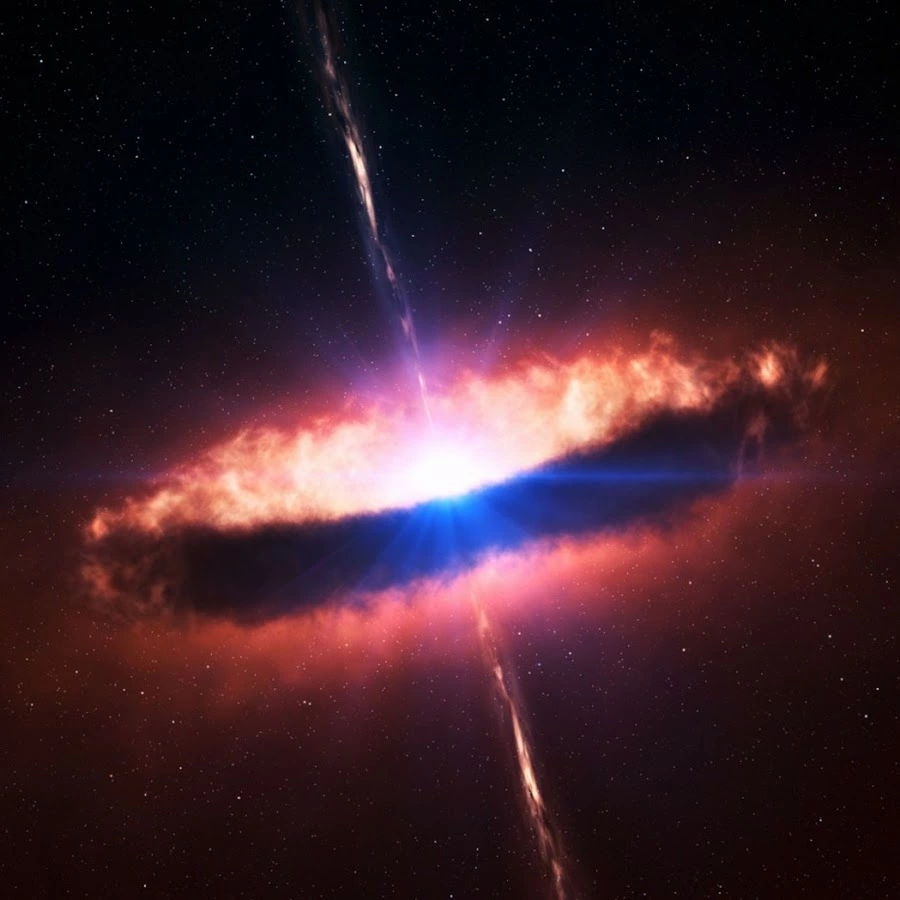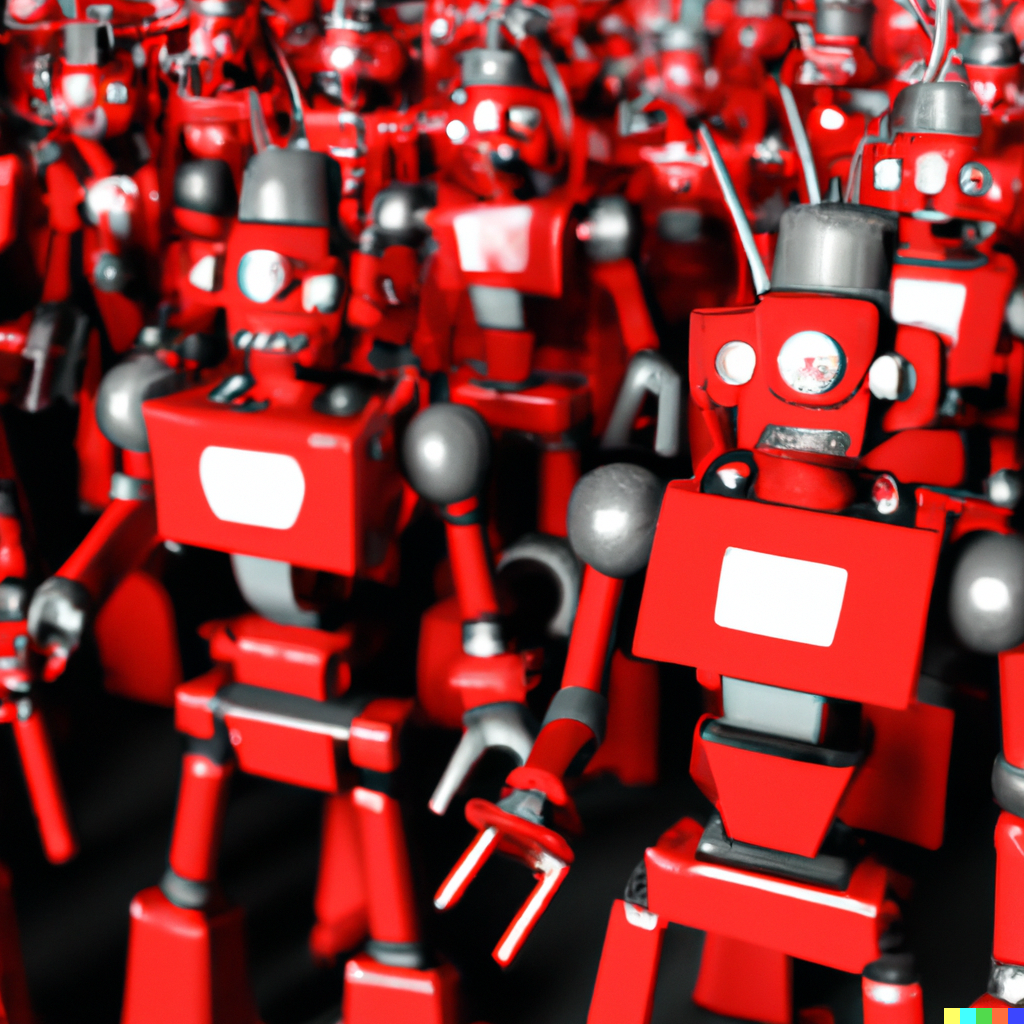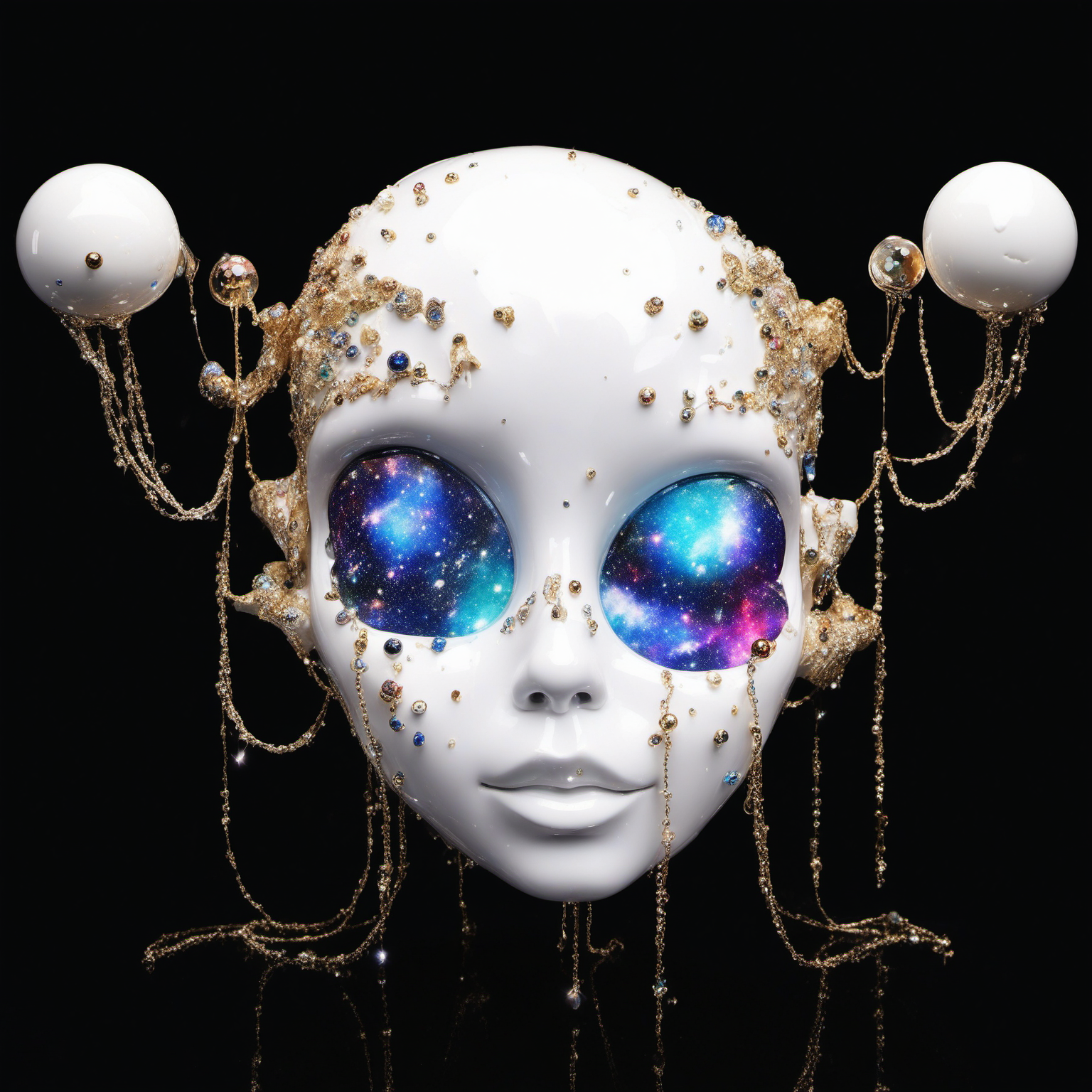EDIT: Let’s cool it with the downvotes, dudes. We’re not out to cut funding to your black hole detection chamber or revoke the degrees of chiropractors just because a couple of us don’t believe in it, okay? Chill out, participate with the prompt and continue with having a nice day. I’m sure almost everybody has something to add.
Dark matter. Sounds like a catch all designed to make a math model work properly.
You’re not wrong. According to the current scientific understanding of the universe, that’s exactly what it is. They just gave it a badass name.
Do you want slightly darker matter? Cause that’s how you get slightly darker matter!
Removed by mod
Do you think solutions to dark matter are tied up in a unified GR + quantum mechanics theory?
Removed by mod
That sounds like it’s trying to take large scale phenomena and make them work on the quantum scale. What if the solution is the other way around: make modified quantum mechanics work on the large scale? (I guess those are effectively the same thing. You’d need a quantum gravity theory one way or another. Sorry, layman here. Just spitballin’ ideas)
The experimental observation did not reveal Dark Matter. Nobody has seen or proven Dark Matter, actually. That’s why it is called Dark Matter. The observation just showed that the math model was flawed, and they invented “Dark Matter” to make up for it.
My personal take is that they will one day add the right correction factor that should have been in the fomulas all the time.
Just like with E=mc² not being completely correct. It’s actually E²=m²c⁴ + p²c². The p²c² is not adding much, but it is still there.
Removed by mod
I know that it is not a simple scale thing here. So it might be something else. My bet is that is has something to do with angular momentum,
Removed by mod
I’m no astrophysicist - I just design computer chips. But this issue of “We need dark matter” came up with rotating galaxies, didn’t it? So I’d look into that direction if there is a potential connection. Classic bug hunting technique.
Removed by mod
The Bullet Cluster, among several other systems, are very strong evidence that dark matter is actual baryonic matter that does not experience significant (or any) electromagnetic interactions. What we see when we look at these kinds of systems is that there is all evidence of STUFF there, but we cannot see the stuff. It’s not an indication of a poorly-performing math model missing a function term.
It would be like if we saw ripples in the water like we know exist around a rock. But we don’t see a rock. Sure, MAYBE we just fundamentally need to rewrite our basic rules of fluid mechanics to be able to create these exact ripples. But the more probable explanation is that there’s a rock we can’t see, and falsifying that theory will require just HEAPS of evidence.
The evidence we have suggests overwhelmingly that there is actual stuff that has mass that we simply do not have the tools to observe. Which isn’t all that surprising given that we are only JUST starting to build instruments to observe cosmological phenomena using stuff other than photons of light.
Yeh, that’s how the scientific method works.
Observations don’t support a model, or a model doesn’t support observations.
Think of a reason why.
Test that hypothesis.
Repeat until you think it’s correct. Hopefully other people agree with you.People are also working on modifying General Relativity and Newtonian Dynamics to try and fix the model, while other people are working on observing dark matter directly (instead of it’s effects) to further prove the existing models.
https://youtu.be/3o8kaCUm2V8We are in the “testing hypothesis” stage. And have been for 50ish years
“Repeat until you think it’s correct. Hopefully other people agree with you.”
Dark Energy has entered the chat.
For those with time to spare: study all you can about neutron stars (including magnetars and quark stars), then go back to “black holes” (especially their event horizons and beyond) and there’s a good chance you’ll feel like a lot of aspects in BH theories are mythologies written in math - all of it entertaining, nonetheless.
For those who seek extra credit, study zero-point energy before reflecting on cosmic voids, galaxy filaments, galaxies, gravitationally bound celestial systems, quantum chromodynamics and neutrinos. Then, ponder the relativity between neutron stars, zero-point energy and hadron quark sea.
The attempts to measure dark matter directly have gotten incredibly sensitive and still haven’t found anything.
Yeah, it’s legitimate science being done, but some people treat it as sacred and would fight you to no end because they say Dark Matter is some certainty, rather than approaching it with the proper scientific skepticism or with a statistical outlook.
For the most part believers in Dark Matter are cool, but a vocal minority practically worship it as the only possible truth.
The certainty is that there is something there, we just don’t know what it is. The name “dark” anything is irrelevant.
If a new hypothetical model showed that either some far off unobserved mass(es) or the currently observable mass can have the gravitational effects that were previously explained by dark matter, or any other far off idea about the nature of gravity at large scale: then there would be evidence there is nothing there. Currently there is no evidence that something is there, just that there are forces and motions that are not understood.
“just that there are forces and motions that are not understood.” - aka, there’s “something” there… Doesn’t have to be a physical something. You’re intentionally misunderstanding or misinterpreting just to try and win points on the Internet.
I mean, they are working on adjusting Newtonian dynamics for the situations where gravity between objects is low. This would fix the model for the strange galaxy spin and where 2 stars orbit eachother.
The issue with this is there are too many unknowns as we have a (relatively) fixed point of perspective. But statistical analysis is working on reducing the impact of those unknowns, and there is likely a paper published in the next few months regarding this.Then, I guess it’s a matter of understanding why this applies. And maybe it applies because of dark matter, and it all wraps back round to an undiscovered thing.
Or, perhaps Newtonian dynamics isn’t complete but has been accurate enough to withstand all our testing (like taking 9.8 as the value of G on earth, even though it varies across the globe, and the moon/sun/planets also have a miniscule impact. For everything we do on earth, 9.8 is accurate enough)Dark matter still has strong scientific support, although still undiscovered.
Modifying Newtonian dynamics has so far been disproven.
Both are worthy of pursuingOkay I see what you mean, the meaning of your words missed me the first time, sorry. You’re saying something is happening, not necessarily that something else exists to cause it.
deleted by creator
Removed by mod
All of physics is a “math model”. One we attempt to falsify. And when a scientist does prove some part of the model wrong, the community leaps up in celebration and gets to working on the fix or the next.
Dark matter started as exactly a catchall designed to make the model work properly. We started with a very good model, but when observing extreme phenomenon (in this case the orbits of stars of entire galaxies), the model didn’t fit. So either there was something we couldn’t see to explain the difference (“dark” matter), or else the model was wrong and needed modification.
There’s also multiple competing theories for what that dark matter is, exactly. Everything from countless tiny primordial black holes to bizarre, lightyear-sized standing waves in a quantum field. But the best-fitting theories that make the most sense and contradict the fewest observations & models seem to prefer there be some kind of actual particle that interacts just fine with gravity, but very poorly or not at all with electromagnetism. And since we rely on electromagnetism for nearly all of our particle physics experiments that makes whatever this particle is VERY elusive.
Worth observing that once, a huge amount of energy produced by stars was an example of a dark energy. Until we figured out how to detect neutrinos. Then it wasn’t dark anymore.
In short, you’re exactly right. It’s a catch-all to make the math model work properly. And that’s not actually a problem.
My personal dark matter theory is that 80% of all stars are surrounded by Dyson Spheres.
Well that’s a fun hypothesis that should be falsifiable. Why not write a paper with some maths predictions? That is a pretty extraordinary claim, but definitely fascinating.
I just read up on it a bit, and there’s multiple things disproving my theory:
- to reconcile our models with our observations, dark matter would have to be primordial, i.e. created shortly after the big bang.
- to explain the movements we see, dark matter must be mostly concentrated in a ring far outside of a galaxy. Dyson spheres would probably be concentrated in clusters spreading from the center of a civilization.
- Dyson spheres would radiate heat we can detect with infrared telescopes, unless you hand-wave it with “aliens found tech that breaks thermodynamics” and at that point it’s the same as saying it’s magic.
Respect looking into it further. If you’re into to this sort of stuff, you might like YouTube channel Isaac Arthur.
I wish more people were like you on the internet
I know, I was so hype a few years ago when a new gravity well model supposedly eliminated the need for Dark Matter, but recently it’s been in the news as a scandal that also doesn’t fix everything.
Modified Newtonian Dynamics (MOND). It’s been the dissenting voice in the modern Great Debate about dark matter.
On one side are the dark matter scientists who think there’s a vast category of phenomenon out there FAR beyond our current science. That the universe is far larger and more complex than we currently know, and so we must dedicate ourselves to exploring the unexplored. The other side, the
On the other you have the MOND scientists, who hope they can prevent that horizon from flying away from them by tweaking the math on some physical laws. It basically adds a term to our old physics equations to explain why low acceleration systems experience significantly different forces than the high-acceleration systems with which we are more familiar – though their explanations for WHY the math ought be tweaked I always found totally unsatisfactory – to make the current, easy-to-grock laws fit the observations.
With the big problem being that it doesn’t work. It explains some galactic motion, but not all. It sometimes fits wide binary star systems kind of OK, but more often doesn’t. It completely fails to explain the lensing and motion of huge galactic clusters. At this point, MOND has basically been falsified. Repeatedly, predictions it made have failed.
Dark matter theories – that is, the theories that say there are who new categories of stuff out there we don’t understand at all – still are the best explanation. That means we’re closer to the starting line of understanding the cosmos instead of the finish line many wanted us to be nearing. But I think there’s a razor in there somewhere, about trusting the scientist who understands the limits of our knowledge over the one who seems confident we nearly know everything.
Great example, and this brings up a great point about this topic - there’s a difference between what’s a scientific pursuit vs. what is current established scientific understanding.
Dark matter is a topic being studied to try to find evidence of it existing, but as of now there’s is zero physical evidence that it actually exists.
Removed by mod
Its observed gravitational effects is evidence. Otherwise nobody would have given it a name.
Proof of gravity from an unknown source affecting an object isn’t indicative of that source’s characteristics, though.
We don’t even know if the force involved is gravity. In fact we don’t even know if a force is involved at all.
I mean yeah that’s why it’s called dark matter. Because we know nothing about it except that it has gravity and doesn’t interact much (if at all) with electromagnetic waves.
The problem is Dark Matter is a theory that proposes specifically currently unobserved matter exists to solve our math problem. That’s not something we can automatically assume, imo. It’s looking highly probable, but not certain. It’s not just a blanket term for impossible to understand forces, okay, it’s not a pseudonym for C’Thulu, it’s a very specific solution among many.
Nobody “automatically assumes” anything. Dark matter is the best candidate of possible explanations because it explains observation and still fits the standard model. Even if they find the necessary particles eventually, nobody would call it certain though. Certainty is a unicorn.
You would like this https://www.youtube.com/watch?v=PbmJkMhmrVI
Interesting tidbit for you. You’d think if it was a math model not working properly that could be explained away with adjustments to the model that we’d be wrong looking at all galaxies. And yet there are galaxies out there that appear to be missing dark matter!
https://science.nasa.gov/missions/hubble/mystery-of-galaxys-missing-dark-matter-deepens
https://www.space.com/galaxy-no-dark-matter-cosmic-puzzle
It doesn’t solve the problem but, it adds to the intrigue I think.
I’m with you here, I don’t understand dark matter and dark energy and the expansion of the universe. We see shit moving all the time in the universe. I’m still not convinced we just don’t understand the motion of the universe outside our envelope of observation and it’s explainable with conventional matter and energy. Im trying to learn a lot tho. I’m gonna watch that video someone posted to you.
I am curious if the opposite of dark matter could be true; while dark matter inside galaxies would explain galactical motion, couldn’t the same be explained by something repulsive BETWEEN galaxies? If the latter were the case, it would also explain dark energy.
The observations of systems like the Bullet Cluster imply that dark matter is actual material – baryonic matter. Stuff that exists in specific locations and has mass. Modifying the math of the physical laws does not explain these observations without absolutely going into contortions where dark matter explains them quite elegantly.
That mothers shouldn’t co-sleep with infants. Every other primate I know of co-sleeps with their offspring. Until very recently every human mother co-slept with her infants, and in like half of the globe people still do. Many mothers find it incredibly psychologically stressful to sleep without their infant because our ancestors co-slept every generation for hundreds of thousands of years.
I would bet money that forcing infants to sleep alone has negative developmental effects.
The reason for this is that we tend to sleep deeper now than our ancestors. Because of this, we are more prone to roll onto a baby, and not wake up.
It can still be done, you just have to avoid things like alcohol, that stop you waking. You also need to make sure your sleeping position is safe. Explaining this to exhausted parents is unreliable, however. Hence the advice Americans seem to be given.
Fyi, if people want a halfway point, you can get cosleeping cribs. They attach to the side of the bed. Your baby can be close to you, while also eliminating the risk of suffocating them.
I think something on the UK’s NHS implied the risk is primarily for mothers with various kinds of problems (including drug or alcohol abuse). Made me wonder if it’s largely recommended for everyone to cover the many people who are at risk but don’t want to think they are.
A lot of the advice is almost insultingly obvious. You get treated like you have a single digit IQ. After a couple of months, I fully understand why we were treated like that! It’s a fight to keep your iq in double digits!
The baby shaking one is the big one. It’s obvious, you don’t shake your baby. It’s also obvious that they can be safe, even while screaming. After 2 hours of constant crying, combined with sleep deprivation, I fully understand why they reiterated not to shake your baby, the urge was alarmingly strong! It also made sense why they pointed out you could leave them to scream, if you really needed to. So long as they are clean safe and fed, 10 minutes down the garden is completely acceptable.
With the original advice, telling when it will apply to you is harder than you think. The default advice has to be to play it safe. Some can be deviated from, some can’t. Deviations must be consciously made however.
Relevant Graham Norton https://m.youtube.com/watch?v=nKbjBciZBZU
Maybe if you can avoid stuff like alcohol (easy for most) but also you can avoid sleep deprivation - way harder with little to no maternal leave and forget about paternal leave here in the US.
If you (Royal you, not parent commenter) can live with yourself if a tragedy occurs on your watch while you are flaunting medical advice, then go ahead and risk it, but otherwise yes! Buy the bedside attached crib!
In the UK, it’s not an absolute no, but a “be careful”. Interestingly, my wife’s sleep habits changed considerably. She was instinctively aware of where our baby was, even while asleep.
The main dangers seem to be either the dad (my instincts were far less affected) or a sedated mum. It also becomes a lot less risky when the baby can move. Our daughter was perfectly capable of making her comfort concerns felt.
It’s not zero risk, but it’s far lower than you might think. New mother sleep deprivation is quite different to normal sleep deprivation. I see why the default advice is what it is, however.
deleted by creator
deleted by creator
Fyi, you triple posted.
Thanks. I was having connection troubles.
The other thing is SIDS, if the baby can’t lift their head from a suffocation position they suffocate.
We have ours sleep in a cosleep crib beside the bed so you get the closeness and can make contact in the night.
What I’ve heard was that it is to build independence for the child, so the parent can leave the child to sleep and do something else. It depends on the age I guess.
I’ve always thought the classic Hunter - Gatherer gender division of labor was bullshit. I think that theory has gone out of fashion but I always thought it seemed like a huge assumption. It seems so much more plausible to me that everybody hunted some days (like during migration patterns) and gathered others. Did they even have the luxury of purely specialized roles before agriculture and cities?
Another reason I think that is because prehistoric hunting was probably way different than we imagine. Like, we imagine tribes of people slaying mammoths with only spears. It was probably more traps and tricks. Eventually, using domesticated dog or a trained falcon or something.
You can read the dawn of everything book which is a very interesting take at a lot of those assumptions which are indeed false. This book goes deep into the ideological bias scientists have when interpreting evidence.
the ideological bias scientists have when interpreting evidence
Surprised you didn’t get downvoted here. It’s like if you tell people science is done by humans and humans arre flawed people flip out and call you a science-denier.
One of the first things you’re taught to understand when interpreting data is that you have a bias. It is impossible not to have a bias.
Take for example: 1+1=2. Is it an extremely simple equation, or a decades long mathematical pursuit to establish certainty?
Our bias tells us we can confidently assert such simple statements, but the truth is, unless we spend an agonising length of time understanding the most insignificant and asinine facts, we NEED biases to understand the world.
The point of understanding we have biases is to think more critically about which ones are most obviously wrong.
The scientific term is bias, the layman term is flawed. When interpreting skepticism from others, many are likely to be biased against the layman 😉
I always assumed that hunter gatherer division was mostly down to the individual, some traits make some better at hunting than others.
I struggle to locate static objects, I for the fucking life of me just can’t see it. I’ll be looking for something and either look right over it or walk past it multiple times
But if I go outside and look in the trees I can spot all the squirrels within seconds. Not like that’s a talent or anything special, but my point is that I’d starve if I had to look for food in the brush, and likely I imagine these types of traits are what defined who did what job, meaning who was good at what, and likely considering lots of hunting was endurance based and not skill based at all, then most adults probably participated to some degree.
I’ve also gone shroom hunting and had to come back empty handed because I can’t see the god damned things.
Is this why I could never find stuff and then when my mother looked she would just go right to it?
Yeah, exactly that. It’s RIGHT FUCKING THERE but I’m not gonna see it.
The hunter-gatherer gender division is actually proven wrong now.
Also, hunting mammoths was a very rare activity. I would expect it to be some kind of desperate activity in fact. People weren’t more crazy than we are, they would rather live than to be trampled by a mammoth.
When you start looking at older debunked theories that lasted for a long time you can see the human bias in them. Not just a human bias but a a western bias.
Two that stick out for me:
Trees compete for sunlight - I think it makes sense to us humans because we compete for resources but in truth trees are way more ‘community’ based
The male alpha wolf - It’s how the western world has been organized for centuries so it’s easy to see that in a wolf pack even though its not true.
Hunting was mostly running a marathon while tracking until the animal collapses.
No reason to believe women didn’t participate in that.I don’t think I ever heard that hunters and gatherers would have been divided by gender.
This has to be a troll comment. I’m utterly bemused.
Haha, if fucking mammoths were scared of falcons then they deserved to go extinct
The idea that animals do not have feelings. I don’t believe complex thought is necessary for emotion. You can take away all our human reasoning, and we would still get mad, or sad, or happy at things.
It’s definitely NOT science that animals don’t have feelings. Maybe 50 years ago.
Now, there’s a concerted effort to discern thoughts and emotions in animals.
I don’t think there is a scientific concensus on this. We are constantly finding previously unknown similarities between the minds of other animals and humans. I’ve put together a small lemmy community on animal communication and digital bioacoustics, it is somewhat related to this stuff.
If anything I think emotional response is the least advanced part of a human mind. However, if we’re talking about brains of sharks, small lizards, or ants then I think emotion would be a word with a lot more nuance than whatever it is they do.
The range of what “emotion” can cover is very broad as well. Like feeling good or scared and shame or respect.
I have remind my partner that dogs don’t share all of the complex emotions we do or at least it’s a lot easier to deal with them if you act like they don’t.
I.E. my dog is never going to care if feeding is fair, and they aren’t going to listen to you out of respect about it. They will however eat a certain way because the like being obedient and knowing their place in the pact, but that takes repetition, rewards and punishments.
that comes from religion not science
Bees play with toys and do happy actions when given toys. I’m of the opinion that some form of internal experience extends at least as far down the brain size scale as at least some bugs, and might extend into single celled organisms and plants.
It’s scientifically proven that rats giggle when tickled:
cut funding to your black hole detection chamber
I knew you’d come for my fucking black hole detection chamber you swine
Curses! You’ve found me out! I’LL GET YOU NEXT TIME! MYA~HEHEHE!
First they came for the black hole detection chambers and I said nothing because I was researching Computer sciences.
Then they came for my HPC clusters
Can we not push more anti science rhetoric please
This is like the second or third post I have seen in the past week talking about “belief” in science. Science isn’t about belief, it’s about understanding. Maybe this post should be, “What facts are you questioning because you don’t understand the underlying data?”
Chill science should be questioned otherwise it’s not science
nooo you gotta have faith in the science!! trust the science!!
Science should be questioned by people who understand the science, not by random people who don’t understand the research. Which a lot of people who know nothing about the science or the maths/data or whatever try to question it
Right, all the people talking shit about dark matter in this thread surely all have 4 PhDs up their ass
No investigation, no right to speak
People are free to express what they think about science. There’s no law saying otherwise. Why are you guys so upset?
“There’s no law against it” is a laughably stupid reason to do something. They’re free to do it but everyone else is free to acknowledge that their uneducated/misinformed skepticism is harmful to society and that their opinions are meaningless to those who aren’t dumb. Leave the contemporary science denial to those who actually somewhat know what they’re talking about.
This is a question on AskLemmy. It won’t change anything in the world. Why do you care? You guys should touch grass
The person you’re replying to believes climate change to be a lie, so I think you’re probably wasting your time.
This is a really stupid take, how do you think new scientists are made if not reaching for enlightenment to answer their own questions?
Science is about being wrong and learning.
Yes, and people that challenge the science who then become scientists actually research/experiment thenselves. They don’t go and claim science is false until they have actual reason/evidence to believe so. One can question science all they want when they do their own science on the matter and it isn’t handily disproved beyond reasonable doubt by existing evidence.
Most science deniers do not do that. Making anti-science claims without obtaining solid, consistent evidence is not science.
The top comment is a proper debate about leading scientific theories, and the most downvoted comment is somebody who thinks the moon landing is faked, both of which have healthy and honest debate with goodwill from both sides.
This entire post is about Skepticism, which is an integral part of Science. To shut down the conversation would be Anti-Science.
Chiropracty isn’t “scientific”.
Op: what are some inherently enraging opinions that fly in the face of everything we know about logic?
Also op: omg guys stop downvoting these inherently enraging opinions. I implicitly made that rule …triple stamped it no erasies!!
I’m going to give you a couple examples:
-
A study showed Dementia brainscans heavily correlating with a form of Plaque. For decades people believed it, but then it was debunked. Someone expressing disbelief in it before the debunking would not have been “flying in the face of everything we know about logic.” They would have been right.
-
A researcher made a study where Aspartame used to sweeten Gatorade correlated with fast developing terminal cancer in mice. The researcher who developed Aspartame shot back by saying they fed the mice daily with the equivalent to 400+ Gatorades. Of course, a French study later showed at large scales people who consumed aspartame were slightly more likely to develop cancer in the following decades, but the outcome was still preferred to the consumption of sugar. This is an example that is much more clearcut in the favor of science, but I think there is still room for skeptics to express doubts.
I think talking about these things in a welcoming environment can both alleviate certain less scientific beliefs while also giving a great idea of how the general public views certain topics. Also it’s fun. There is a guy in here who thinks maybe a dude can fight a bear, not that they should.
Of course, a French study later showed at large scales people who consumed aspartame were slightly more likely to develop cancer in the following decades
If we’re gonna be correct about this, the study showed that there’s potentially an increased risk of developing cancer but there is a lot of data that still needs to be analyzed, so it’s a bit early to draw conclusions.
Okay, but if anyone forms full beliefs from single studies, they’ve grossly misunderstood the details of how science works.

This particular hierarchy is specific to medical science, it doesn’t fit the other scientific disciplines perfectly.
Also, if I had a nickle for every conflicting pair of meta-analyses… happens so often.
Fair, but my point is that it illustrates how much stock one should put in single studies.
-
Science articles that reference paywalled journals you can’t actually read. Most of them are probably making stuff up because they know no one will be able to call them out on it.
First, let me start off by saying that I agree with what I believe your actual premise is (or should be) - that articles in science journals should not be behind paywalls. I’m strictly against the practice, I think it’s a massive scam, and so does everyone I know who does research. I have paid to open source every paper I’ve published. Well, not me personally. But thank you taxpayers for funding me to not only do my work but to make sure you have access to it too. I’ll talk about this more at the end.
With that out of the way, I’d like to mention a couple of things. First, the scam is on the part of the academic journals, not the researchers or the journalists writing the articles. It’s not part of some scam to hide the fact that the journalist is making crap up. If the authors were unwilling or unable to pay the fees for open sourcing their papers ($3-5k when I was doing it several years ago), then you’re either going to be in an institution that has a subscription to the journal or you’re going to have to find some way of acquiring it.
Search for the exact title in quotes. Sometimes the Google Scholar engine will return with the default link to the pay walled page, sometimes it’ll have a link to a prepublication server. Arxiv is one of the more popular ones for physics, math, and computer science of all stripes. Step 2 is to go to the institution web page of the first author. Very often, researchers will keep an updated list of their publications with links to the PDFs. If that still doesn’t work, you can write the author and request the paper. We love those emails. We love it when people read our work, especially when they’re so excited that they wrote to request a copy. None of these involve copyright infringement. That prepub that you get is the same paper (usually but you can confirm with the author if that’s a question), but possibly without the masthead and layout from the journal. It’s still cited the same.
So, why are so many journals behind a paywall? Because the publishers want to monetize what today should be a cost free (or minimal) set of transactions. Here’s what happens:
- I have an idea for some research. If it’s good and I’m lucky, I get money from the government (or whomever) to do the work, and I use it to pay my expenses (salaries, materials, equipment, whatever). I also get taxed on it by my institution so they can pay the admins and other costs. When submitting a proposal, those are all line items in your budget. If you’re doing expensive research at an expensive institution, it’s pretty trivial to set aside $10-20k for pub fees. If your entire grant was $35k, that’s a lot harder to justify.
- You write the paper after doing the work. You don’t get paid to write the paper specifically - it’s part of the research that you are doing. The point here is that, unlike book authors, researchers see zero of any money you’d pay for the article. If you do locate a copyrighted copy, you’re not taking a dime out of my pocket. Again, just thrilled someone’s reading the damn thing.
- You pick a journal and send it in. The journal has a contact list of researchers and their fields, and sends out requests for reviewers. They usually require 2 or 3.
- The reviewers read the paper making notes on questions they have and recommend revisions before publication. Reviewing is an unpaid service researchers do because we know that’s how it works. The irony is that it challenges the academic notion of the tragedy of the commons. You could be a freeloader and never review, but enough people do it that the system keeps rolling.
- You revise, reviewers approve, publisher accepts and schedules date. There can be some back and forth here (this is a legitimate publisher expense, but the level of effort and interaction isn’t like with a book editor).
- Your paper comes out.
As you can see, the role of the publisher is very small in the overall amount of effort put into getting an idea from my head into yours. At one point publishers had an argument that the small circulation numbers for things like The Journal of Theoretical Biology justified their $21k/year institutional subscription price.
And I shouldn’t have saved this til the end, but for the one person who skimmed down to see where all of this was going:
Any science article / press release that cites a paper whether or not you have access to it at least is citing something that has undergone peer review. Peer review can only do so much and journal quality has a wide range, but it’s about the best we have. If it’s a big enough deal to actually matter and the media in question has wide enough reach to care, then it will get back to the author who can then clarify.
Just because you said you guys love it when people read your work, I thought I’d let you know I read your entire comment.
Thank you!
Appreciate the thoughtful and in-depth response. My worry is more that a science article’s editorialized interpretation of the paper may be wrong or misleading, than that the public isn’t very able to scrutinize the quality of science in the paper itself. Waiting for a possible email response from a researcher is pretty much always going to be a little too high effort for someone wanting to spend a few minutes comparing claims in the article and claims in the paper to potentially call bullshit on discrepancies between them in an online comment.
I absolutely agree with you there. I just commented a short time ago on an article about the effects of primate vocalizations on the human brain. The article not only got the conclusion of the paper wrong, they got the very nature of evolution wrong. I didn’t even have to read the paper - I haven’t gotten to it yet. It’s admittedly the kind of mistake non-biologists make. Journalists should probably avoid drawing conclusions that aren’t specifically in the source material. My point is that, going off of the author’s quotes the pulled and my own knowledge of evolutionary dynamics, I knew it was wrong. However, I am not at all sure that someone without a background in biology would be able to understand the paper well enough to catch the error in the article.
I am all for open access, and I share your frustration. I think you should be able to access any paper you want for free. But I’ll also say that if you don’t have the background in the subject to know what the underlying paper will have said, the chances are pretty good that you’re not going to understand the paper well enough to find the flaws.
I used to talk to a physicist named Lee Smolin who proposed a Darwinian model for universe formation. I can follow the evolutionary part, but when it gets down to the physics of it, I’m lost at sea. So when I read an article about him - I read something about him recently - I mostly have to go on my basic understanding because there’s no way I’d make it through that paper.
And literally the only reason I’m throwing this out there at all is that, unlike a physics paper that’s totally incomprehensible and obviously so, people believe in their own interpretations on social science or public health papers. I see more kinds of cherry-picking abuses and simple misunderstandings there than elsewhere.
It’s great to see people so inquisitive though.
Thank you for the write up, very interesting!
To add onto that, whenever a newspaper says “based on the findings of researchers at [Random University]” but they don’t list the citation anywhere at all. That is just evil, but somehow industry standard.
I’ve had a field day while writing my thesis recently, realising I could bypass the paywalls by accessing the papers through the university proxy. It’s still bs, though, because it leaves this stuff only accessible to researchers and not your regular people who may be interested.
Though like PrinceWith999Enemies said, many paper writers will happily send you a copy if you email them about it.
Unfortunately, most scientific papers are behind paywalls, especially the most prestigious journals. So this doesn’t make much sense.
??? That’s exactly why it makes sense though?
We don’t need more anti science rhetoric in this world. Why even start this thread?
So obscure opinions are made visible and we can talk about them?
If you can’t be questioned, you’re not science.
Disbelief≠skepticism
There are people in the comments denying literal, established, concrete facts. That’s not questioning anything,; that’s ignorance at best and malevolence at worst.
You decide what’s fact. Everything you ever thought you knew is stuff someone told you and you believed it based on their presentation. You’ve never seen evidence. You’ve seen them telling you there’s evidence.
Try doing some simple physics experiments with pendulum and stuff. It is quite simple to set up and will make you use many different physics concepts.
For quantum mechanics, I suggest diffraction and the double slit experiment that are quite easy to do with a cheap laser pointer.
That way you can rediscover scientific models yourself!
If you are not willing to try it, then you don’t really have legitimacy criticizing thé work of scientists.
I’m not criticizing work so much as all the things where the claim work is done but wasn’t.
As a flow artist, I understand pendulums more than most. I heckin live pendulums! I play with them every day!
Science is good. Science publishing is out of hand.
What if you’re doing the research real-time? What if you, yourself, have done the experiments which logically are evidence? There are a lot of things you can scientifically prove yourself. And there are a lot of phenomena you can mathematically prove without even doing the experiments, although you have to try to mitigate or account for chaos / the specific environment you’re working with.
Conspiracy bullshit like “you haven’t seen the scientific evidence so it might just all be made up by so-called scientists” is garbage. You are a nut if you think that. It is on the same level as flat-earthers and anti-vaxxers.
Oh yeah, I’m not against the idea of science. Doing it yourself from the ground up is pretty solid. All of your own experiences are at the very least valid as you experienced them.
If you can believe the scale of vote fraud Trump pulled off, you can believe that textbooks are often written with an interest in influencing our young. I’m mostly against history as it’s taught. It’s written by the victors and so much of it comes off as fables and allegories to keep people in line.
Psychologists branding everyone with a disorder. You can spend a whole lifetime trying to understand yourself and you won’t. 4 years of schooling and a book full of labels doesn’t give you any extra magical understanding of everyone else.
You know I felt this way for years. I felt that way through psychopharmacology in pharmacy school, and I felt that way during our psychiatry and behavior lectures in medical school. I felt like psychiatry was minimizing behavior to these boxes was far too reductionist. Then I spent a month in an inpatient psychiatry facility as a third year medical student.
While I completely agree that each individual is unique and people are more than their diagnosis, you’d be absolutely shocked by just how similar patients’ overall stories, maladaptive coping mechanisms, and behaviors are within the same psychiatric illness. I can spot mania from a doorway, and it takes less than five minutes to have a high suspicion for borderline personality disorder. These classifications aren’t some arbitrary grouping of symptoms: they’re an attempt to create standard criteria for a relatively well preserved set of phenotypic behaviors. The hard part is understanding pathology vs culturally appropriate behavior in cultures you don’t belong, and differentiating within illness spectra (Bipolar I vs II; schizophrenia vs bipolar disorder with psychotic features vs schizoaffective)
You’re part of the problem.
Thank you for your insightful and well-researched response. I’ll remember that as I continue to provide high-quality evidence based care to all of my psychiatric patients in the future while you bitch about stuff on the internet.
That stuff you and your buddies wrote together to justify your income isn’t really evidence. Maybe you even believe it is. Everything you ever thought you know is just stuff others told you and you believed it based on their presentation.
No, in fact I believe very heavily in evaluating primary literature to re-evaluate decades-old dogma within medicine. I regularly disagree with my professors when they present outdated information in lecture. I have no income right now, and I have forgone substantial amounts of income by pursuing medical school instead of continuing to practice pharmacy. I’m not in this for the money.
If you would be so kind, I would love to know what evidence you present in contrary to the decades of peer-reviewed cohort, case-control, and RCT data which validate psychiatry as an effective field for managing psychiatric illness. I’d be happy to discuss any scientific data you have that I haven’t seen, and would be happy to change my opinion if it is data-driven.
I can appreciate your skepticism towards medicine and psychiatry, but if you can’t defend your position with anything but accusations and conspiracy, then I don’t think we have much else to discuss.
Funny how you bring up conspiracy given how psychiatry is widely used as a tool to discredit. You all keep control of public image by posing yourselves as authority and your opposition as mentally ill. You’re literally doing it right now.
I have a feeling you’re in dire need of their expertise.
Ad hominem.
Just keep control of image. You are authority and your opposition is mentally ill.
Hey it’s ok to be wrong on this one.
4 years where? To become a real psychologist (not a therapist) in most places you need a PhD or a PsyD. In total, you probably do at least 8 years of schooling.
Not to mention that that “book full of labels” is constantly reviewed and was made based on consensus from psychiatrists, which are medical doctors with a lot more than 4 years of schooling.
Ok me and several others are constantly reviewing the pirate anime One Piece. It takes a long time to complete and we’ve collectively decided that it’s better than every other show and probably something that happened for real.
I feel that, I feel like diagnoses is one of the least important parts of psychologists’ work. And if they assign medication based solely on that limited scope, then there is clearly a problem.
EDIT: To clarify, I think medication should be used to treat specific symptoms when there are no contraindications, I think it is wrong to assign medication based on a broad categorization.
Psychology isn’t science so no harm being doubtful about parts of it.
I saw a study that concluded toilet seats in public restrooms were actually one of the cleanest surfaces in the restroom. Don’t dispute that - it just means that the entire area lands somewhere in the spectrum between disgusting and eldritch nightmare. Due to the finding that the toilet seats were cleaner than most other surfaces in the restroom, it further concluded that it was perfectly safe to just plop down bare-assed onto that nastiness.
Abso-fucking-lutely not. The toilet paper bird-nest is a must. A few layers of splash protection toilet paper in the water before I even sit down is a must. ‘Ick’ factor aside, there are enough contact acquired pathogens to justify extreme caution in environments like that. I ain’t risking ass warts over some hypothesis, study, full-blown peer reviewed theory, or anything in between.
Not just compared to the other surfaces in a restroom. I believe keyboards and phones both lost to toilet seats in that comparison too.
I could see it in Quantity but not the qualities of the pathogens. A disease contracted from a toilet that has had contact with blood and feces versus a grimy membrane keyboard shouldn’t even be a contest.
It’s probably bad form to bring this type of comment over from reddit but in this case I can’t help myself.
Username checks out.
Full moons do not have an impact on people with mental illness, make weird things happen, increase work load, or increase the chance of going into labor. I have worked in three separate hospitals in three separate states and the consensus is: full moons bring out the crazies and the babies.
It’s not true. Your observations may be affected by confirmation, bias, or other things.
https://www.dukehealth.org/blog/myth-or-fact-more-women-go-labor-during-full-moon
However, barometric pressure can apparently induce labor
The first part is what my husband tells me.
I do recognize that Medical Laboratory Scientists are a very superstitious lot especially funny since our degree and certification include Scientist. Don’t say it’s slow or quiet because it’s getting to get stupid busy (and everyone will blame you). Don’t run quality control more than required because you are tempting failure and will have to do a look back of all the testing to make sure it was accurate. We jokingly put an elf on the shelf out that had FDA written on the hat and the FDA showed up for an unannounced inspection a week later. I’m a Lead and every time I bring my Lead work to the bench with me, we get so busy with patient samples and orders that I can’t touch it. All are definitely confirmation bias situations.
That’s actually really interesting, the medical professionals I’ve been acquainted with never seemed to mention that theory to begin with.
Hypothesis*, and it is very popular with nurses. Unfortunate, but people still believe many strange things.
It’s entirely confirmation bias. The crazies come out, must be a full moon. It isn’t? Oh, then it’s just a bad day. It is a full moon? See, I told ya. Full moon and no crazies? Didn’t even notice.
I have witnessed this exchange >.<
Unrelated - kind of - but I believe there are two documented cases of obscure programming bugs that manifest according to the phase of the moon!
I believe there have been multiple studies that found that full moons affect most people sleeping and make sleep a bit harder
I sleep in a completely blacked out room yet I know when it’s near the full moon because my sleep gets very broken and restless.
The only difference between a full moon and a new moon is how much light it reflects towards the earth. The moon is still there. If there were some sort of magnetic or gravitational effect on you while you slept, the effect would be the same whether the sun was shining on the side you can see or not.
The reason there is a difference in how much light is reflected, is because the moon is in a different position. During a new moon, it’s on the day side of the earth (so in between the sun and the earth) while during a full moon, it’s on the night side.
So there could theoretically be a gravitational effect, although I don’t think it would impact anyone’s sleep.
If anyone is noticing a difference in sleep quality, it’s most likely indeed to do with the amount of light.
Statistics shows that the belief is wrong. It’s funny I think that despite the hard numbers the people working there still strongly believe it.
I’m incapable of coming to terms with the scientific fact that a 194cm male could not take a grizzly bear in a fight
Maybe if he was 195cm ?
I can respect that, but stay out of the enclosure.
Sorry to disappoint, but I am 200cm tall and I would get annihilated in an instant.
Is your height 194 by chance?
have you seen a grizzly bear? those things are huge, and strong. a black bear or something maybe, but no way can people believe their stronger than a grizzly
deleted by creator
Plus the idea that SSRIs work, period. They only work slightly better than placebo, and they count them as “working” as long as they help with a single symptom. So if they don’t help your depression at all, but they do help with your insomnia, they put that in the “it worked!” pile. That’s why suicide risk sometimes increases on SSRIs. They do nothing for your crippling depression except increase your motivation, so before you were depressed and couldn’t accomplish anything, and now you’re depressed, but also have the wherewithal to follow through on your suicide plan.
I have been having some mental health issues, and I was reading about this the other day. I was going through wikipedia with the various types of antidepressants, and it seems that SSRIs are just barely better than placebo, or even in studies not even better than placebo.
I know there are multiple classes of antidepressants out there. Are there any that do a better job, even if they are not as common?
There’s different definitions of depression, for one.
And “do a better job” is going to be defined by the individual.
But there are SSRIs, SNRIs and SDRIs like Wellbutrin. They have vastly different side effects and play on different systems (serotonin, norepinephrine and dopamine) many people find SNRIs to be more effective, but again it’s all the individual.
Placebos just prove that your body can heal you, it just chooses not to.
So then what does one do to heal it?
senzu bean
If you’re suffering from depression, look into Transcranial Magnetic Stimulation (TMS). After over a decade on SSRIs and other meds had failed, it turned my life around in six months. Literally life saving.
The effectiveness is proven (at much better rates than SSRIs), but the exact mechanism is under study.
But… There was a recent study that suggested that many cases of depression are caused by misordered neuron firing, where the emotional center of the brain fires before the “imagine the future” bit finishes firing. Normally, when a healthy brain imagines a future state, the emotional center fires in response to our anticipated feeling. (Imagination: We’re going to the movies. Emotions: FUN) But in a depressed brain, the emotional core fires immediately, resulting in the current, crappy mood being applied to every imagined future. (Emotions: Everything is shit. Imagination: We’re going to the movies?)
TMS may work as well as it does because one of the things it does is increase neuroplasticity, allowing the brain to correctly order the firing of our emotional response to imagined futures.
Anyway - TMS is right at the edges of our understanding of treating depression, but it really does work for a supermajority of patients.
For me, I went from having literally lost all emotions and being essentially dead (and being willing to die), to feeling… normal. I haven’t had a major depressive episode in the two years since. It’s been liberating.
I duno about any that work, but if a dr offers you effexor tell them hell fucking no. Everyone I have talked to about it agrees its fucking absolutely awful. Worst drug I have ever taken.
What sort of problems did you have with it?
Effexor has some awful side effects. I have seen people complain about brain zaps but I didn’t get them. For me I kept getting this weird lagging feeling in my body, like my perception of my limbs was lagging behind where they were in this very weird feeling way. Its very hard to explain but it was very uncomfortable feeling, every movement of my head was accompanied with this weird feeling. After I quit the drug the issue persisted for months after, it was legit fucked I was scared it would never go away but eventually it did.
Also effexor triggered multiple manic episodes where I was hearing voices and didn’t sleep for a week. Like legit psychosis. I haven’t had any episodes that bad before taking effexor and none since I quit it as well. I can honestly say it made my mental health issues infinitely worse, shit is a demon drug. TBH I don’t fuck with psych drugs anymore because of my experience with effexor.
actually studies have shown SSRIs make you more depressed than placebo
I was listening to a sleep scientist the other day and they were saying that one thing we know is that depressed people have more rem sleep on average, and SSRIs decrease the amount of rem sleep.
If it is something sleep based that goes some way to explaining why it takes time to have an effect. Building up or wiping out a sleep debt can’t happen instantaneously.
That’s interesting… because I always thought that REM sleep was the most important part of sleep, and more was better.
In fact, I read an article once that suggested that REM sleep was when our spinal fluid flushed all the waste material out of our brains at night (which leads to the types of dream that occur during REM sleep), which is also a process that prevents brains from being clogged with waste material.
I always thought that our brains being filled with waste material was part of depression, and that flushing out that waste material would help our brains function more correctly.
Sounds like the opposite - like, our depressed brains are depressed because they think too much?
Characteristic sleep-EEG changes in patients with depression include disinhibition of rapid eye movement (REM) sleep, changes of sleep continuity, and impaired non-REM sleep.
https://www.ncbi.nlm.nih.gov/pmc/articles/PMC6386825/
Yeah, I think we have multiple types of sleep because we need them, and if you’re getting too much rem sleep at the expense of other types it’s going to cause problems.
Interesting!





























